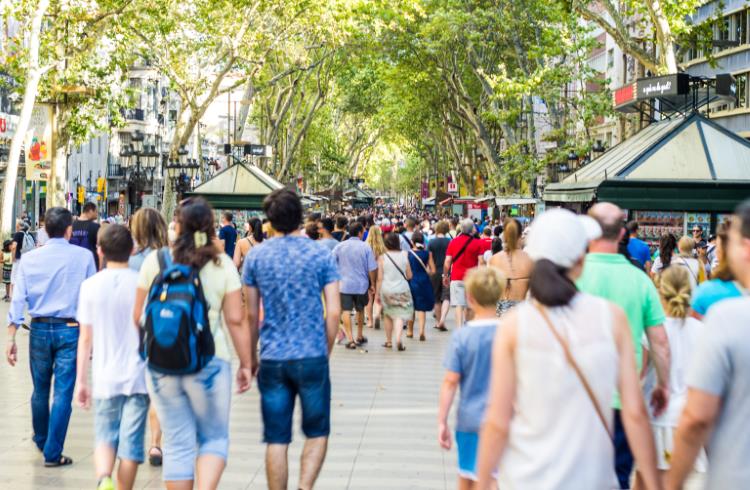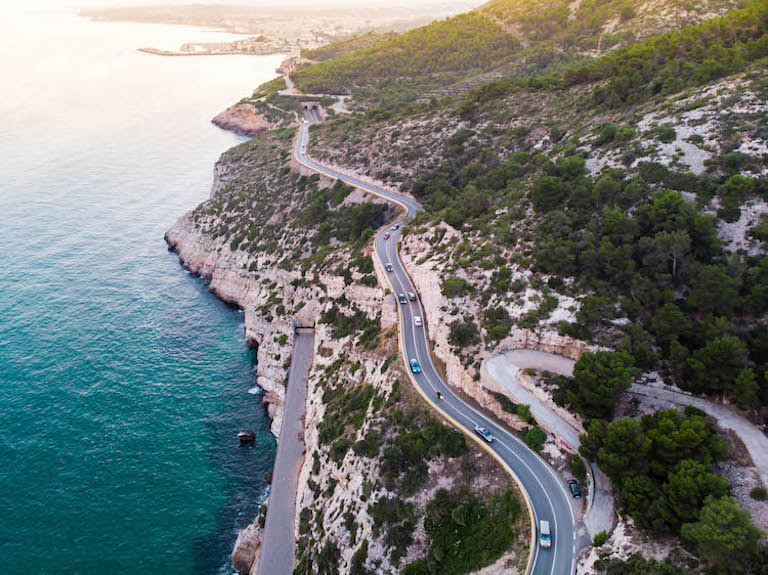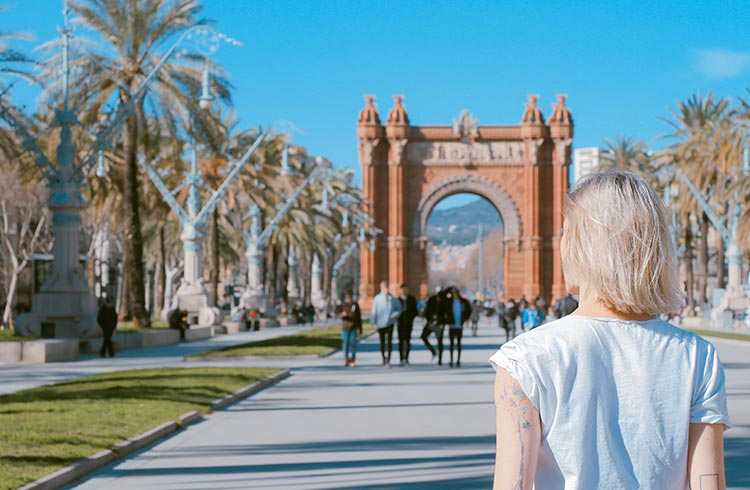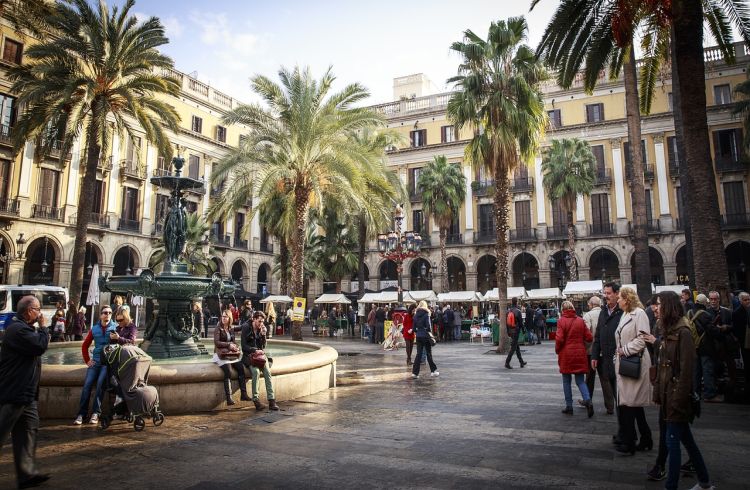Overtourism and safety in Barcelona
A local’s guide to enjoying the city safely and responsibly
 Photo © Getty Images / Eloi_Omella
Photo © Getty Images / Eloi_Omella
Tourists sprayed with water guns in Barcelona made headlines internationally in 2024, making for plenty of conversation and concern about safety in Barcelona, for visitors and locals alike. After the incident, I had friends and family asking about overtourism in Barcelona and if I felt safe living here. The answer - yes, I feel safe living in Barcelona, but it's true that when I venture to the old quarter, pass through Plaza Cataluna, walk along main streets, such as Calle Laietana or Passeig de Cataluna, I'm more vigilant and attuned to my surroundings.
Visitors don’t need to cancel their plans to visit this vibrant, progressive city. There’s so much to love — the Mediterranean Sea, mountain views, Gaudí masterpieces like Casa Batlló and the Sagrada Família, world-class museums, incredible food, and a lively nightlife. Just keep in mind that overtourism is a growing issue, and stay aware of your surroundings to avoid becoming a target for crime.
- Understanding Overtourism in Barcelona
- How to visit Barcelona responsibly
- Barcelona travel tips for a less touristy experience
- Safety in Barcelona
Understanding Overtourism in Barcelona
Barcelona is a popular European travel destination with 30 million tourists visiting annually, compared with a population of over 1.7 million residents, according to the City Council.
Barcelona has one of the highest rents in Spain, and the cost of living continues to increase. Residents complain and protest overtourism in Barcelona, as many feel they are being pushed out and can no longer afford to live in their own city. I've heard from friends and locals since arriving at the end of 2021 that the city is an amusement park for tourists.
Rental prices in Barcelona have increased by 13.3 percent in just one year, according to Idealista, a rental and home buying platform. Meantime, there are over 10,000 licensed tourist apartments, reducing the availability of long-term rental apartments. The mayor, Jaume Collboni, has confirmed he doesn't plan to renew the tourist licenses in 2028, so more housing will return to the market, per the City Council.
How to visit Barcelona responsibly
Practice responsible tourism
- Choose hotels over Airbnb or apartment rentals.
If you opt for an apartment, the city has been cracking down on unlicensed tourist flats and has launched a campaign to bring more awareness to the issue. Residents and visitors can check if their tourist rental is licensed or not by entering the address.
- Be polite and courteous
This may seem obvious, but I often see visitors blocking doorways and entryways as they take photos or pose on motorcycles. Many people live in the old quarter and you may be inadvertently blocking the entrance to their home.
- Be aware of noise levels
If you're enjoying the bar scene or nightlife, don't congregate on the street and chat on the sidewalk late at night. Noise carries easily in the city, so be aware that there are apartments above the restaurant, bar or nightclub. Talk quietly to avoid disturbing residents who are trying to sleep.
Barcelona travel tips for a less touristy experience
Tourism never stops in Barcelona. You'll see tour groups and tourists year-round. Typically, there is a slight decrease from November to early spring.
- Everyone wants to see the views from Parc Güell and Gaudí's creations. If it's on your must-see list, consider going on a weekday as the weekends are very crowded. Consider visiting less-visited parks, such as the Jardin Botanic and Jardins de Mossèn Costa i Llobera in Montjuic, a garden dedicated to cacti and succulents.
- Mercat de la Boqueria is a popular food market that now draws mostly a tourist crowd. Visit Mercat de Santa Caterina in El Gothico instead, one of the 39 food markets throughout the city.
- Sign up for a cooking class to learn Catalan recipes and support a project that helps train individuals in marginalized communities, including refugees, to work in hospitality.

Safety in Barcelona
Because Barcelona is a tourist-focused city, there's more petty crime than other regions of Spain. Visiting this city requires paying attention and being vigilant of your surroundings and belongings, especially in the more touristic areas, such as Las Ramblas, the neighborhoods of Raval, El Born and El Gothico. In 2024, Barcelona recorded 180,342 crimes, and around half were thefts, with 41.7% occurring in public spaces and 23.3% on public transit, according to Catalan news.
Pickpockets work in groups and with different ages and backgrounds, so it's not obvious they know each other and target tourists, especially in crowded areas. One thief may distract you while another pickpocket pulls a wallet or phone out of your purse, backpack or back pocket and it goes unnoticed.
Here are some Barcelona travel safety tips
- Purchasing a Metro or public transit card and need help? Ask an employee. People are often friendly but you run the risk that it's someone with ulterior motives. Typically, it's riskier to get help from a stranger in more tourist-heavy places. I overheard a woman who had purchased a MetroCard at the airport share that a stranger offered to help her and in hindsight, was too close her. She realized fifteen minutes after being on the metro that her wallet was gone and the pickpocket had already pulled around 500 British pounds from her account. He saw her input her PIN and where she placed her wallet under the guise of "helping her."
- Taking the bus, metro, tram or train? Have your public transport ticket handy, ideally without needing to pull it out of your wallet at the stop or while boarding. If pickpockets are around, they're observing where your valuables are. I take out my transport card when I'm home or before I get to the bus stop or metro and place it in my pocket so it's easy for me to access. I never pull out my wallet when I'm on public transit.
- Don't walk and text. I see tourists walking on crowded streets staring at their phones while walking and it makes the person a potential target, especially when they're speaking English loudly with their friends. In a split second, it would be easy for a thief to grab someone's phone from their hand and run away or pass it off to someone they're working with. I've heard locals tell me stories that phones have been ripped out of their hands while having a phone conversation.
- Be mindful of anyone on scooters, as some are thieves who snatch bags. Now, not every person who rides a scooter is a pickpocket, but as a form of protecting yourself and staying on guard, I assume anyone on a motorized scooter is a potential thief. When I lived in the neighborhood of El Born, I heard people screaming "Ladron" (or “Thief”) too many times during the year I lived there and sometimes I'd see a group chasing after someone on a scooter.

Read more about safety in Barcelona to learn more and consider travel insurance that protects your baggage and belongings against theft.
Although Barcelona is suffering from overtourism, it's still a beautiful city to visit. Visiting just requires being more alert and self-aware especially in more touristy areas. Opt to visit lesser-visited parks, markets and areas for a more relaxed experience or sign up for a class as a way to be a more responsible traveler.
Travel insurance doesn't cover everything, and coverage may differ depending on the country of residence, state or province. Carefully read the policy wording for a full description of coverage, including the terms, conditions, limitations, exclusions and termination provisions of the plans described.Related articles
Simple and flexible travel insurance
You can buy at home or while traveling, and claim online from anywhere in the world. With 150+ adventure activities covered and 24/7 emergency assistance.
Get a quote


No Comments